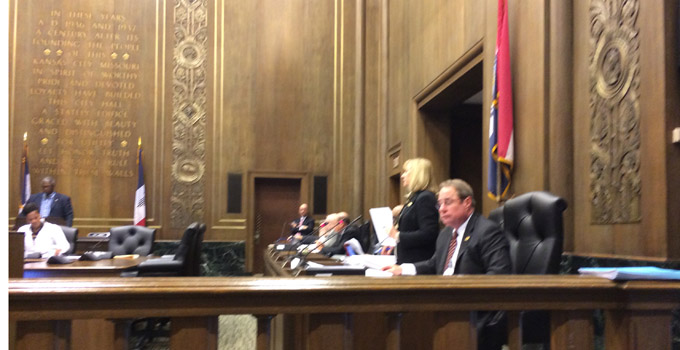
4th District COuncilwoman Jan Marcason during yesterday’s discussion of charter changes to go on the ballot.
By Joe Lambe
The most intense city council debate Thursday involved two city charter change proposals that will not go to the voters.
Three less controversial changes, including changing election dates from the dead of winter to summer, passed easily and will be on ballots in August.
Only one councilman supported the most controversial proposal – changing the council seats to 12 in district instead of six in district and six citywide – but five voted to submit it to voters.
That proposal hotly debated last year by the charter review group finally died on that 8-5 vote.
It began long ago with a push from some minorities that included U.S. Rep. and former mayor Emanuel Cleaver. They argued it would help increase minority representation. Opponents said it would balkanize the city and replace a system that has worked well.
Many in the charter review group said they opposed the change but voted to send it to the council for more debate.
Councilman Scott Taylor said political pressure got it to the council and now some in the council wanted to pass the debate on to the voters.
“I think that’s passing the buck,” he said.
Mayor Sly James said he thought it was a bad idea and would campaign against it but voters should get a chance to decide.
Councilman Ed Ford said, “Voters expect us to act as gatekeepers” and not submit bad ideas to them.
He noted the change would only allow people to vote for one council member and the major, opposed to six council members and the major now.
Councilman John Sharp, the only one who supported the change, said citywide votes were historically used in the south against minorities and give voters a “teeny, tiny” vote for more candidates.
In smaller districts voters may only get one vote but it counts more and neighborhoods can band together and have more power, he said.
Another proposed change that was voted down 10-3 would have allowed voters to decide if the mayor had the power to fire the city manager.
Ford called it a move to a much stronger mayor government that would neuter the city council.
In effect, the mayor would have the power to hire the city manager and control him, Ford said.
Councilwoman Cindy Circo noted how difficult things were when former mayor Mark Funkhouser tried to fire the manager, failed and gridlock ruled until the city council finally relented and fired the manager.
“What is best for the city is when the manager and the mayor – even if one of them may be dysfunctional – are communicating,” she said.
James noted that he and a whole host of past mayors spoke in favor of the change.
He said his office is next to that of the manager and “We talk, talk, talk, talk all the time.”
The system would work better with the change, he said, although he has no wish to fire the city manager.
“You’ve got a system where a married couple can’t get divorced until … their closest friends say it’s OK,” James said.
In other matters, the council voted to submit to voters a series of housekeeping changes that include adopting a five-year budget plan.
And it approved a change to the charter that would add the Kansas City Health Commission to it and remove all departments except those for law, finance, fire, health, human resources and parks.



Who’s talking